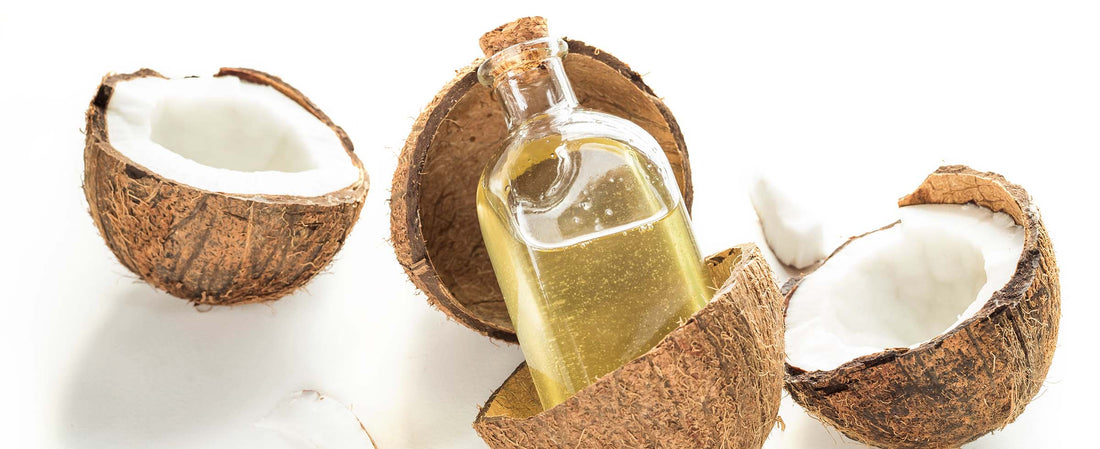
How to Choose the Right Coconut Oil -An Ultimate Guide!
Share
Does coconut oil seem to be everywhere these days? It's become more popular than any previous health fad. Your social media news feed is probably full of articles and blogs promoting the health advantages of coconut oil, and so are your morning coffee conversations with your family and friends. So which coconut oil should you buy before you join the herd?

Coconut oil comes in a variety of forms and labels in grocery stores including Organic Coconut Oil, non-organic, virgin, raw, refined, and saturated. It's hard to tell which goods will provide the finest results. Read on to know more!
Coconut Oil Benefits
-
Effective in weight loss
To speed up your weight reduction, try using Coconut Oil For Cooking or as a salad dressing. The high concentration of MCTs (medium-chain triglycerides) is responsible for this fat-burning effect.
Some research also suggests that it prevents you from succumbing to random food cravings, which might help you stay on track with your weight loss efforts.
-
Improves dental health
Coconut oil's antimicrobial characteristics make it a useful complement to any oral hygiene program. They reduce the risk of cavities and plaque buildup with regular gargling and rinsing.
One quick and easy method to get rid of bad breath is to practice Oil Pulling with Coconut Oil that has been pressed using a wooden spoon.
-
Glucose for the brain
Medium-chain triglycerides (MCTs) are a form of saturated fatty acid that has been shown to enhance memory. For want of a better phrase, it's like glucose for the brain. Coconut oil is highly recommended by medical professionals for patients with Alzheimer's disease since it aids in the restoration of brain tissue.
-
Helps fight allergies and infections
When applied to the skin, coconut oil's anti-fungal and anti-microbial qualities work to ward against infections and calm irritation. Furthermore, it can be used to dry wounds to alleviate itching and ultimately avoid scarring.
-
Helps quit smoking
If you are a heavy smoker, resisting the impulse to smoke is very difficult. Coconut oil may not be able to eliminate the desire to smoke entirely, but it will assist you to fight the desire.
Two tablespoons of oil per day is a good starting point, or you can make an essential oil "quit smoking mix" to help you kick the habit for good. Coconut oil is enhanced by the addition of chamomile, peppermint, or rosemary essential oils. The combination can be used beneath the nostrils and on the hands.
-
Acts as an insect repellant
Though some may disagree, slathering coconut oil for skin indeed helps protect you against bug and mosquito bites. The oil's fatty acids help form a barrier on your skin, which repels insects.
-
Helps improve hair texture
You probably know that your ancestors solely used coconut oil on their bodies, as told to you by your parents and grandparents. But even now, when there are several options for skin and hair care, coconut oil is unrivaled.
In addition to hydrating and nourishing your skin, it also provides a healthy dose of vitamins and minerals. Every famous person and style blogger claims that coconut oil is the only thing they use on their hair.
-
Helps in bone health
Loss of bone mass is a natural consequence of aging, brought on by free radicals and oxidative stress. Coconut oil has been demonstrated to increase bone density in a scientific investigation. Coconut oil's high antioxidant content and miraculous healing properties make it a helpful aid in restoring broken bones.
-
Combats acidity
Coconuts have been used for years as an acidity remedy by people in tropical countries. Acute acidity and painful acid refluxes are problems that affect one in two people nowadays.
Anti-oxidant qualities found in coconut oil may help mitigate these problems. Two tablespoons of wood-pressed coconut oil taken internally or massaged into the stomach can help.
But, how can you choose good coconut oil? With our ultimate guide below, we hope you can make the right choice for a good coconut oil.
How to decode the label?
The label should be your first stop when shopping for coconut oil products. Labels often use deceptively vague terms, such as "virgin" or "Pure Coconut Oil" without explaining their actual meaning. With this information in hand, you can confidently shop for coconut oil.

Coconut oils are majorly of 2 types.
-
1. Refined coconut oil
It involves heavy processing - to make it cheaper and neutral in taste. The usage of chemicals, high temperature and pressure leads to more quantity of oil being produced and thus benefits the commercial industries.
Since it is flavorless, odourless and devoid of natural nutrients, it should be avoided at all costs. Smoke point - slightly higher than unrefined coconut oil (400 °F). Thus, Coconut Oil for Cooking is highly suitable.
-
2. Unrefined Coconut Oil
These can be of 2 types (depending on the extraction method).
- Extraction from the milk of fresh coconuts- generally referred to as ‘extra virgin coconut oil. In this type of oil, natural nutrients, antioxidants, aroma and flavour are retained. There are no guidelines regarding the nomenclature of the extraction process, hence the best practice is to read the label.
-
Extraction from dried coconuts (copra) - generally referred to as cold pressed or virgin coconut oil. There are majorly two sub-types.
- Expeller Pressed (cold pressed) - oil extracted by pressing copras in iron expeller machines at a high temperature and pressure.
- Wood Pressed - extracted by pressing the coconuts in traditional wooden Kolhus or Chekkus at low temperature, thus retaining the nutrients, aroma and flavour. Smoke point - slightly higher than unrefined coconut oil (350 °F). But it is also suitable for all types of cooking.
Hydrogenated coconut oil is another option. This refined oil has been processed to the point that it becomes extremely stable and stable throughout time. Hydrogenated coconut oil differs from its unrefined counterpart in that it is solid at room temperature and has a greater melting point.
To produce this type of coconut oil, unsaturated fats are converted into heavy and trans fats. It is not advised to use hydrogenated Coconut Oil For Cooking.
Packaging and storage
Glass containers are the preferred container for coconut oil. Toxins from plastics may leak into products over time and affect human health. Keep away from coconut oil that has been stored in plastic.
It's possible to store coconut oil for up to two years without spoiling. Because it turns solid below 24C (75F), you shouldn't keep it in the fridge, but you should keep it in a dark place out of the sun.

-
Different ways of using coconut oil
Coconut oil extracted from the milk of fresh coconuts or the one that is extracted by wood pressing the copras is the best one for health. It can be used for all types of cooking like - baking, deep-frying, and sauteing. And can even be consumed directly.
The taste of unrefined virgin coconut oil is welcome in some baked goods, smoothies, and hot beverages. Some studies have shown that ingesting 1–3 tablespoons of Pure Coconut Oil daily can have positive effects on health.

-
Conclusion
It's probably obvious at this point that coconut oil has numerous health benefits. But does your coconut oil contain all the beneficial elements that make it so?
Did you know you can buy coconut oil from Anveshan Farm? Their coconut oil, extracted from fresh coconuts in Tamil Nadu, can lend a distinctive flavour to any recipe.

-
Having gone through a no-heat method guarantees that its contents will be unadulterated and unaltered. This versatile oil may be used in a wide variety of ways, from frying to baking to oil pulling to skincare and haircare, and it's full of healthy ingredients to match!
You can purchase the product here.
FAQs
Q1. Is refined coconut oil healthy for frying?
Although refined coconut oil still contains some of these elements, it does so at a reduced level. The high smoke point of refined coconut oil (about 400 degrees Fahrenheit) makes it ideal for frying.
Q2. Which coconut oil is healthy?
Coconut Oil that is cold-pressed, unrefined virgin coconut oil in a glass jar is healthy for consumption. By reading labels carefully, you can ensure that you're getting the pure coconut oil that's been revered as a healthy food around the world without losing any of the enzymes, antioxidants, or fatty acids that make it so effective.
Q3. What is the best coconut oil for your health?
Unrefined, virgin coconut oil is the healthiest type of oil.
Q4. Which is better coconut oil or virgin coconut oil?
Virgin coconut oil is better. The reason for this is that the heat required to dry copra can lower the antioxidant content of cold-pressed coconut oils, just as it might with any other food processing procedure. The antioxidant and vitamin content of virgin coconut oil is higher than that of cold-pressed oil.



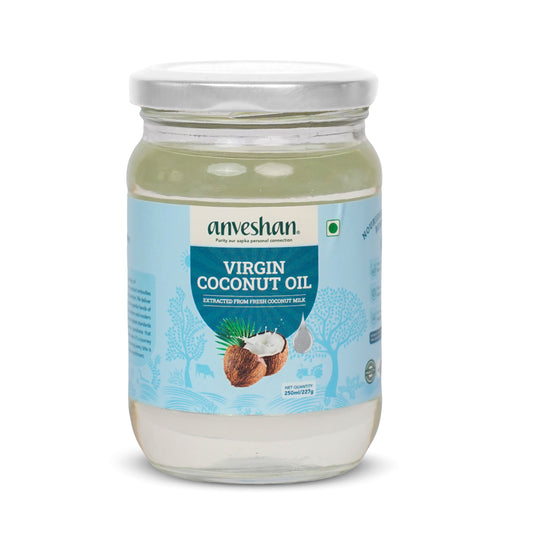
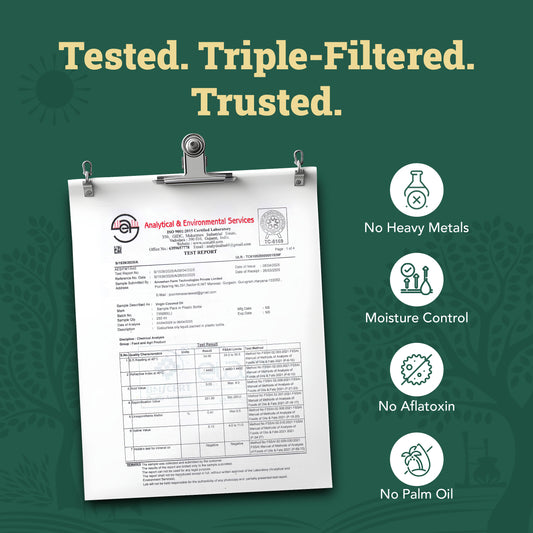
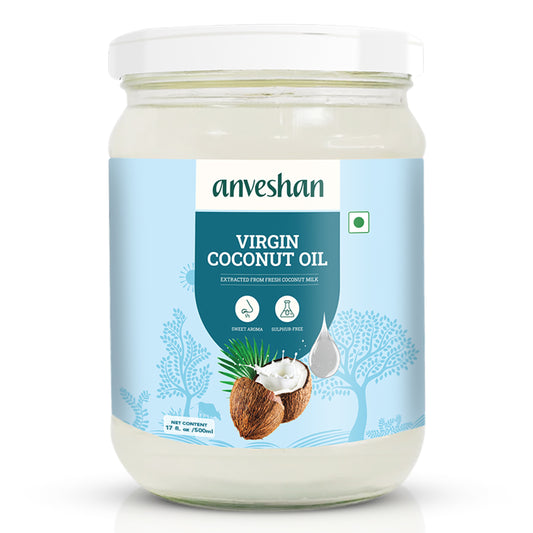
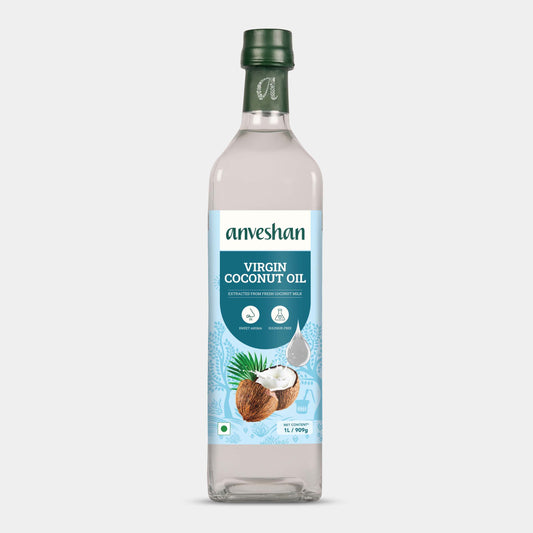

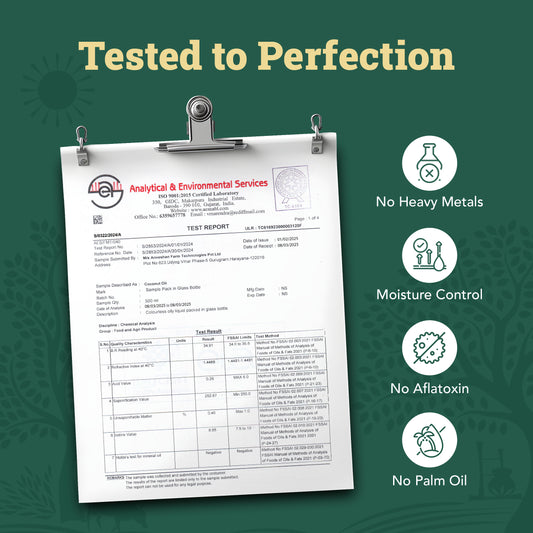













 You saved ₹-48 on this order
You saved ₹-48 on this order

